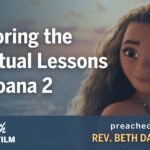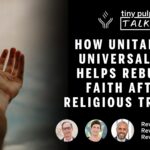Wherever We Go | Rev. T. J. FitzGerald | 09.17.23
In the first sermon of our “Living a Purposeful Life” series, Rev. T. J. FitzGerald asks “How do we take our faith with us into the rest of our lives?” Let’s consider ways to bring together parts of our own lives.

Sermon Transcript
What a Risque Vegan Restaurant Can Teach Us About the Value of Systems
You know when it’s hot like this, sometimes I just can’t cook for myself, so I’ve just been discovering all the takeout venues here around Dallas. There’s a new one in Deep Ellum I found, and decorum prevents me from saying its name in a church.
No matter how much Our Whole Lives (OWL) I’ve taken, I’m still not comfortable with saying that name. But if you’re curious and you have a phone or a computer, you can look up a famous restaurant chains started by Pinky Cole in Atlanta that made its debut here in Dallas a few months ago and you might blush just like me.
There are items on the menu whose titles would make a sailor blush. And when you order certain menu items there and you never know which ones they’re going to be, some very kind, lovely person, who’s taken your money will holler to the kitchen, “Someone’s ordered a blankety blank out here!”
Last weekend I visited Pinky Cole’s place, it’s what I call it. There was this customary very long line accompanying very long wait like there should be for good southern food. I was right next to a woman with her four children in line, her four little sweet children in line. When it was my turn to order, I ordered my two sandwiches, (it was one of those weekends.) And the name of the second was a little more risque than the first. I felt shy saying the name out loud in front of this kind woman and her four children. And of course that was the name the cashier decided to yell out “Someone’s asking for a blankety blank out here.”
I looked at the mother with sort of shamed expression. IT didn’t bother her in the least. And the rest of the people in the line behind me had a good chuckle. The cashier who yelled this awful word handed me my receipt and told me, “They’d call my name when the order was ready.” She smiled, thanked me for coming in, and the kitchen got to work on what I ordered on my blankety blank.
There’s something powerful at work there. You know what it is? It’s not the profanity because I wasn’t saying bad words out loud just for amusement. It wasn’t the food because plenty of places have good food. It was something else going on there. The power was in the system that the chef had created. The name of the restaurant, the names of the menu items, the joy on the faces of the employees, yelling out those menu items. The chuckling of the customers all together transformed awful words in isolation, good food in isolation, into a community experience of joy with a good side helping the banana pudding, which always helps.
Our Plan for 2023-24
Last week in worship, in case you missed it, we had a little slide show for you all about the plan for worship and programming this year here at church. We promised we’d have the plan here for you to take with you today and we shut off the air conditioning so that you’d have to wave it in your face. You cannot miss it. It’s right there in a half sheet. It’s a kind of system, a little like a menu, a little less profanity depending on your point of view religiously.

Right now, today we are in the Living a Purposeful Life part of the year. And you’ll see that you’ve all been assigned the very simple task of doing the spiritual inner work to transform your personal life. So get busy. You’re welcome. Then in mid-October, we will enter a season when we examine and experience rituals like All Souls together, powerful experience here. We practice rituals then with our bodies together and by ourselves that give us a grounding in this community and in its beliefs, in our beliefs, and values. Then we have Thanksgiving, hanging of the greens, all the parties and winter celebrations. And then we start the new year off like everybody should in a fiery blaze. New people, don’t worry. We just light little things on fires, little pieces of paper to help let go of some of the things we want to let go of in the next year.
And then this ritual, like others, will guide us into ways to activate our spiritual lives. For those of you looking for a translation, that means doing something grounded in your faith. Then we get active and put our faith into practice in our lives in different locations, creating a sacred geography here. This will be during the Lenten season when we consider the events coming, in the Easter season, the spring season. And then at the end of the church year we look at what you are for, what people are really for. We ask what the work we have done to find our purposes and we put into action what has been done that might shift the tides in the world around us.
Whew. Right? It’s a lot. It’s a system though. It’s a plan, a map, a menu. Call it what you want. And it’s one we know will work. That’s what plans and menus are for after all, right? Not just screaming profanity into the kitchen.
A Visit to the National Underground Railroad Freedom Center
I know this because this weekend I was making use of a map. For the past few days I was in Cincinnati, I just got lost in the map. No, I’m just kidding. I was there and on the recommendation of some thoughtful congregants, a friend and I visited the National Underground Railroad Freedom Center.
I already happened to love Cincinnati, something for which I was mocked by some of my friends. I love Cincinnati, but if you need a reason to love Cincinnati or just to visit it, the Underground Railroad Museum is it. It’s set right on the banks of Ohio River overlooking it. The muddy crossing to a new life so many took from the south. And the museum is, it is, a special treat if you are a student of unitarian and universalist history, is it ever.
But you know what was an even more special treat for everyone else visiting the museum when I did? Map in hand, wherever we went, there I was through the whole exhibit pointing and calling out a lot louder than I had to. “She was a unitarian. Oh, they were a universalist. He was a little bit of both.” Even when a placard told a story about someone and left out the unitarian and universalist part, I’d fill it right in. I was delightful I assure you. Even when the battle him of the republic played loudly at a section of the exhibit, I let it be known that Julia Ward Howe was a unitarian. Those poor people at the museum with me, they should have gotten their money back. It was like I was back in that takeout restaurant. “Oh, unitarian here. Oh, universalist here.” Couldn’t help myself proclaiming the truth.
Of course, looking back now, I was wondering, are these just justice seeking individuals who happened to find their way to unitarian or universalist faith communities? Or did the unitarian and universalist faiths turn these people into justice seekers? What came first? The plant-based chicken substitute or the flax egg? It’s for those of you who looked up the restaurant. And does it even matter which one? What comes first? I’m starting to think it does. There’s a lot to learn from people who get to do great things and just happen to be unitarian/universalists, I get it. But sometimes when I hear us talking unitarian/universalists, it’s sort of like we have a huge ego with a massive inferiority complex, right? “Look at these amazing people. Look at all they’ve done. I’m one of them. I must be awesome too. Well, they probably would’ve done all that stuff anyway regardless of where they worshiped and what they believed. So if it didn’t matter that much to them, it doesn’t matter much to me.” This is what goes on… Welcome to this episode of Inside the Therapist’s Studio.
So I’ve been here a year now and it’s part of why my mind is changing about this. I’ve witnessed the systematic and thoughtful and strategic ways you, you, the members of this community and my colleagues here on the staff address systemic wrongs in this society. And It’s changed my tomb. Mine eyes have seen the glory, friends. I do believe at the core of this faith rests personal and communal responsibility, absent threat and coercion, yes, and also rests the belief that we must make of this world the heaven we hope to see on it. Those are core beliefs. And these twin truths make the quest for justice for right the only logical course. Mine eyes have seen the glory, friends. Amid the backdrop of even this song and more than a few of other songs from our hymnal, I might add, the primary theme of this entire museum was that systems of oppression and bondage are not gone. Not gone. Systems of oppression and bondage have only changed. Legal/illegal chattel slavery persists in the world and so do other systems like them, and those systems are working just fine. That’s right. We should be.
They’re working fine for the people they benefit. Working just fine. One quote on the wall of the Museum said this, “The Jim Crow system still exists. It’s just called something different now, public education in poor communities.” Yeah, I like this museum because even the walls were preaching. My friend who was visiting the museum with me after about an hour of looking around and then after reading this wall of quotes from some former US presidents, two of whom are Unitarians, I might add, who should have been a lot more committed to the abolition of slavery. That unitarian/universalist thing and that museum, it cuts both ways, friends. Be warned. My friend looked and heard those quotes and looked around and he said, “This place brought its receipts. It brought all the receipts. You have a question about what you ordered in this country, they have the receipts right here.”
The museum also had some movies to watch. Some were documentaries, some were reenactment style. In a provocative moment in one of the reenactments, a Kentucky traitor and human captives encounters an Ohio minister on Ohio soil. The Kentuckian is pursuing a person he claimed as property. And the Ohio minister, the Kentuckian knew, was assisting, the person escaping from forced labor and captivity. The Kentuckian says that there are actors. “I’m well within my rights to kill you for what you’re doing and collect the bounty.” The Ohio minister, and a true story, whose sons were armed and hiding along the road the Kentuckian would need to use to make his retreat says, “Cooley, last I checked, you got to be living to collect a bounty.”
The reenactments were all drama friends. And it struck me then. The Ohio minister’s faith was butting up against the system he knew was wrong and he forged a weapon from that faith that was both a defense of his own life, his sons armed on the road, and an attack on the system of forced servitude and captivity. His life held in that delicate balance. “You can kill me, but you’ll never live to tell the tale.” It sounds like a western because it was. That’s what was happening. It’s a blunt example I know, but a potent and a true one.
Creating a Plan for Your Faith
In our reading, Victoria Safford writes, “I believe the suffering and death of living things as part of a grand and natural cycle, tragic only because we alone among animals are so aware of mortality and time. Death is not a part of happiness at all, but it makes clear the urgency of joy.” Risk unto death matters. Death is not a part of happiness. It makes clear the urgency for joy. Faith, real faith, takes planning, a system, a balance. And your faith is worthy of good planning. You are worthy of good planning and attention. You hear me now, right?
Who knows if the world or the universe has a plan? But if it doesn’t, I think we ought to, okay? Because people with plans, in case you haven’t seen the news today, people with their plans, even when they are put on trial by a state legislature, are getting away with their plans.
They don’t want people to call out in these systems, they don’t want people to name what they’re doing. They are counting on our silence. But with a system in place that lets hard things be said, with a system in place to nurture the gifts that you have, with a plan in place, with this plan in place, unless you’ve got another one, we can speak up, find the actions we need to take and put those plans in motion. You and your life are worthy of good planning and attention and the world needs that. Believe that.
Now, not everyone’s faith looks the same. I know that. Our faith is a little different than some others. You’re not going to catch us invoking the help of our unitarian and universalist saints. We can’t just be out there telling people, “Julia Ward Howe will not be having any more of that nonsense.” Or, “Margaret Fuller is going to write an essay about you next and put it in the Atlantic if you don’t shape up.” These are inside Unitarian Universalist jokes. But these are the jokes. This is my favorite. “Elizabeth Cady Stanton is watching you.” I think that one’s true actually.
Shaming and threats are not really part of what we do here. Our faith, this faith for centuries has been instead a response. Not a reaction, response, to the plans others have made for domination, demonization, and damnation. To which we say respectfully, “No.” Our faith, this faith, and for centuries it has been, in another part, a response that includes loving, ethical treatment for all, compassion for those who are hurting and fairness in all we do, to which we answer emphatically, “Yes.” We answer yes to love. We answer yes to reason. We answer yes to truth. We answer yes to plant-based substitutions for chicken.
And we answer yes to these wherever we go this year, into our family relations, into our friendly relations, into school board meetings, into meetings with our representatives we’re going to encourage you to schedule, into activities at church and in the wider community. We bring these wherever we go as proud as any of our faithful ancestors of the waves that we will be making, the claims that we will be staking and the pains we will be taking to glimpse at last the glory of the coming of the day when we as a human community can stem the tides of want, of oppression, and of injustice, and unleash the tides of abundance, of freedom, of equity, and of course at last of joy. This is the plan. Joy is the plan and taking that with us wherever we go. May it ever be so. Blessed be and amen.







